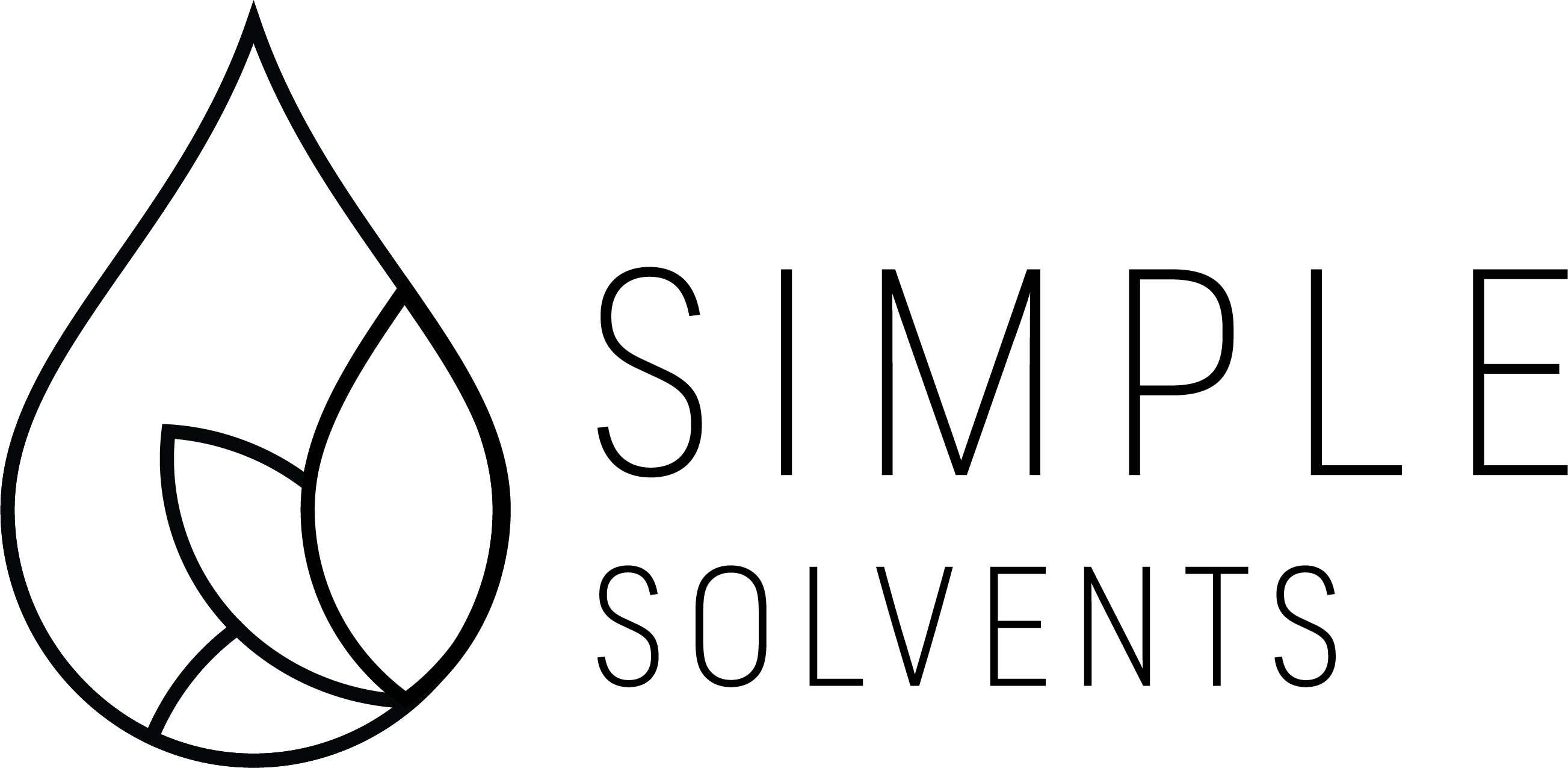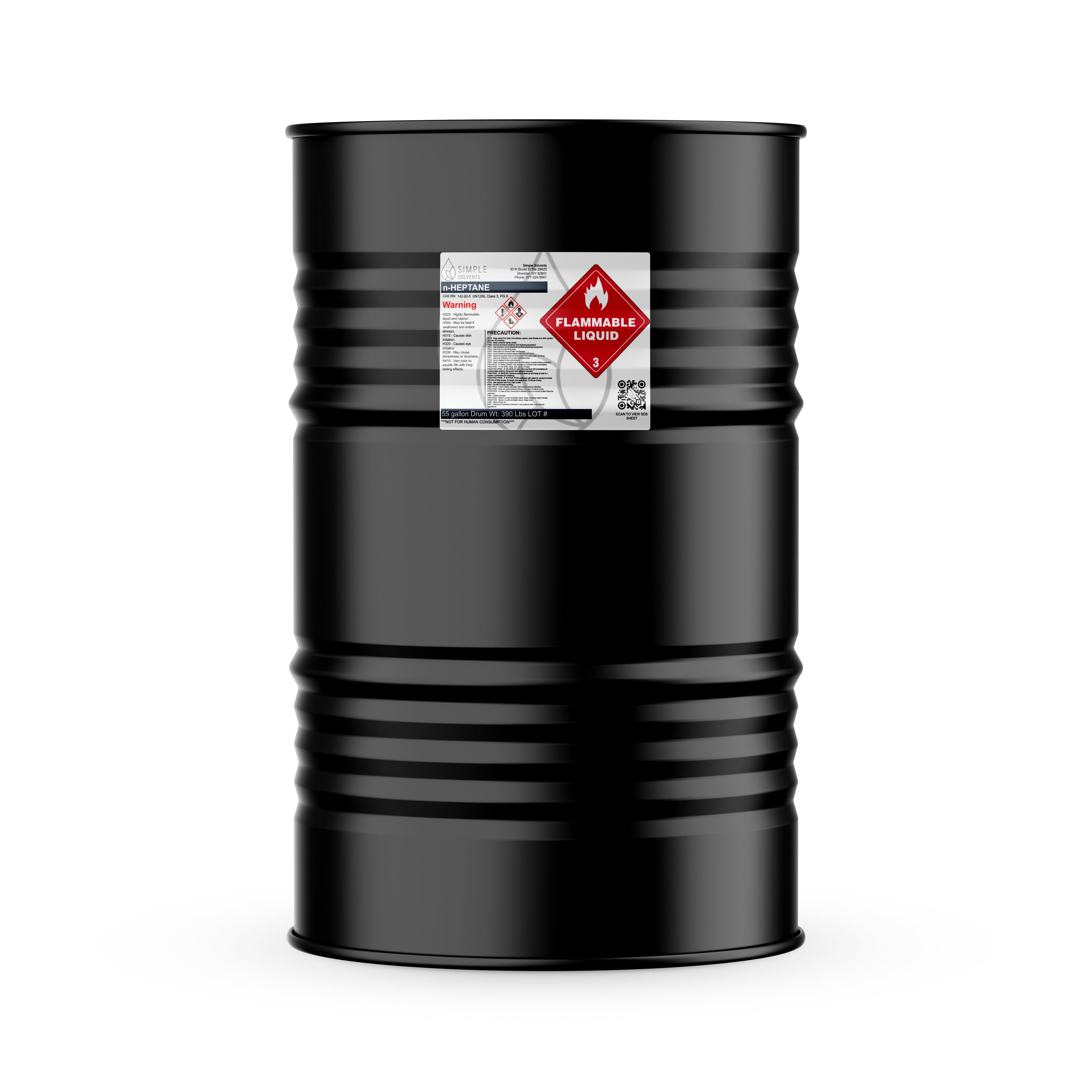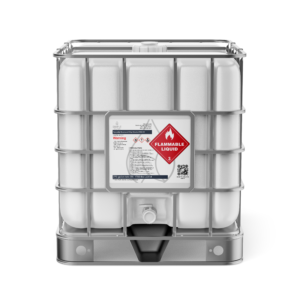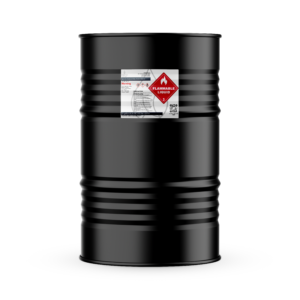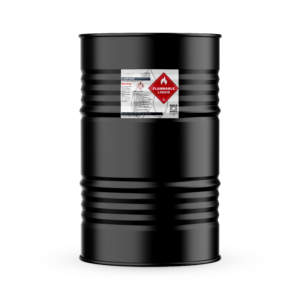n-Heptane
n-Heptane. Normal Heptane.
$1,275.00
Bulk pricing & price matching available
Lab Tested
Secure Payments
Quality Guarantee
Fast Delivery
n-Heptane – Normal Heptane
n Heptane is a highly purified, straight-chain alkane with significant applications across various industries. n-Heptane is renowned for its purity and effectiveness in diverse uses, making it a preferred solvent in multiple sectors.
n-Heptane Uses
- Synthesis of Polymers: n Heptane is crucial in producing polymers like polyethylene. It acts as a reactive diluent during polymerization, helping to maintain viscosity and ensuring the optimal performance of the final polymer products.
- Solvent Purification: Due to its excellent solvent properties, n-Heptane is used to purify other solvents, such as hexanes, in laboratory settings. Its low boiling point and high volatility make it ideal for solvent extraction and recovery, enhancing the accuracy of laboratory experiments and research.
- Resin Production: n Heptane is a key ingredient in manufacturing synthetic resins with superior adhesion properties and bond strength. It contributes to the production of resins that are ideal for demanding industrial applications, adhesives, and coatings.
- Fatty Acid Analysis: As a powerful solvent, n-Heptane enables precise analysis of fatty acids in food samples. Its selective dissolution of fat-containing compounds ensures accurate nutritional content determination, adhering to food safety and quality standards.
- Electronics Cleaning: n-Heptane’s excellent cleaning properties make it ideal for removing contaminants from electronic components, including sensitive computer chips and circuit boards. Its low surface tension and high purity ensure thorough cleansing and optimal device performance.
- Pharmaceutical Production: n Heptane is used in pharmaceutical production for the formulation of medications such as antibiotics and antifungals. Its high purity and compatibility with active ingredients are crucial for ensuring the quality and efficacy of pharmaceutical products.
- Protein Extraction: n Heptane is valuable for extracting and purifying proteins from biological samples. Its selective precipitation abilities enable researchers to study protein structure, function, and potential applications in biotechnology and pharmaceuticals.
- Polymer Analysis: Researchers and quality control analysts use n-Heptane to analyze polymers and assess their properties. It facilitates techniques like gel permeation chromatography (GPC) and infrared spectroscopy, providing insights into polymer performance and suitability.
- Organic Synthesis: N-Heptane, a straight-chain alkane, is widely used in organic synthesis as a solvent due to its non-polar nature and relatively low reactivity.
- Solvent for Reactions: N-Heptane solvent is often employed as a solvent for reactions that require non-polar conditions, particularly those involving hydrophobic compounds. It helps dissolve reactants and maintain a stable reaction environment.
- Chromatography: In column chromatography, n-heptane is used as a mobile phase for the separation of non-polar compounds, aiding in the purification and analysis of organic mixtures.
- Extraction: It is used in liquid-liquid extraction processes to separate non-polar substances from more polar ones, enhancing the efficiency of compound isolation.
- Paints and Coatings: n-Heptane is integral to the formulation of paints, varnishes, and coatings. It dissolves resins, pigments, and additives effectively, ensuring smooth application, durable finishes, and desired rheological properties.
Industries:
- Cleaning & Sanitization: n-Heptane is used in cleaning and sanitization processes due to its ability to dissolve oils, greases, and other contaminants. Its effective solvent properties make it ideal for maintaining equipment and surfaces.
- Cultivation: In cultivation, n-Heptane is used in extracting essential oils and other compounds from plant materials. Its non-polar nature helps in isolating specific compounds without interference from water-soluble substances.
- Environmental: n-Heptane is employed in environmental testing and analysis. Its properties are useful for assessing pollution levels and conducting various environmental studies.
- Government: In governmental applications, n-Heptane is utilized for laboratory analyses, research, and various quality control processes where precision is critical.
- Healthcare: n-Heptane finds use in healthcare settings for preparing samples, cleaning laboratory equipment, and other applications requiring high-purity solvents.
- Laboratory: In laboratories, n-Heptane is a valuable solvent for chemical reactions, extractions, and as a reference standard due to its consistent quality and purity.
- Water Treatment: n-Heptane is used in water treatment processes for extracting and analyzing water contaminants, providing a reliable method for assessing water quality.
Product Details:
- CAS Number: 142-82-5
- Common Names: n-Heptane, Heptane
- Scientific Names: n-Heptane, normal Heptane
Advisory Statement for n-Heptane Hazards – Storage & Handling
n-Heptane is a highly volatile solvent with significant evaporation and pressure buildup characteristics. Due to its low boiling point and high vapor pressure, proper storage and handling are crucial to ensure safety and maintain product integrity.
Volatility and Storage Considerations:
- Heat Sensitivity: n-Heptane should be stored in a cool, well-ventilated area, away from direct sunlight and heat sources. Exposure to high temperatures can increase the risk of pressure buildup in storage drums, which may lead to bulging or rupture. It is imperative to avoid storing n-Heptane in environments with extreme heat, such as warehouses lacking air conditioning or temperature control.
- Pressure Buildup: To prevent pressure issues, ensure that drums of n-Heptane are kept sealed and in a stable, temperature-controlled environment. Open drums in areas without adequate ventilation or temperature control pose risks of increased pressure and possible hazardous conditions.
- Open Drums: Having an open drum of n-Heptane in an enclosed space can lead to rapid evaporation and the accumulation of flammable vapors. This poses significant fire and health risks, including potential explosions in the presence of ignition sources.
Shipping and Extreme Conditions:
- Shipping Risks: During summer or in areas with high ambient temperatures, there is a heightened risk of drum bulging or leakage due to the expansion of n-Heptane vapors. We advise considering these factors before placing orders in warmer months or for locations with inadequate temperature control.
For safety, always ensure proper ventilation, temperature control, and secure storage practices. Following these guidelines helps mitigate risks associated with n-Heptane’s volatility and ensures a safe handling environment.
When dealing with class 3 hazardous materials like certain solvents, it's crucial to prioritize safety at every step, from purchasing to shipping and receiving. At Simple Solvents, we take care of all aspects of delivery, ensuring that our customers receive their products safely and in compliance with regulations. Here are some essential safety precautions and information needed for handling these materials responsibly:
Safety Data Sheets (SDS): Customers can access Safety Data Sheets (SDS) for all our products, which provide essential information about the chemicals, including hazards, handling procedures, and emergency measures.
Understanding Hazards: While we handle the hazardous materials, it's important for customers to understand the specific hazards of the products they are purchasing, such as flammability or reactivity, and how to mitigate them in case of emergencies. Always read the safety data sheet before buying, using, storing and disposing chemicals.
Transportation Compliance: Our operations adhere to the Department of Transportation (DOT) regulations for shipping hazmats. Be sure to communicate with your local authorities regarding permits and regulations for buying, storing, using, and disposing of chemicals.
Proper Packaging: We use approved containers, labeling, and packaging materials to prevent leaks, spills, or accidents during transit, ensuring that hazardous materials are delivered safely.
Storage Considerations: Always store hazardous materials in designated areas with proper ventilation, temperature controls, and secondary containment measures to prevent accidents and minimize risks during transportation / storage.
Disposal Procedures: Be sure to understand proper disposal procedures and regulations that are unique to your location.
Emergency Response Plan: Always be equipped with a comprehensive emergency response plan, including procedures for spills, leaks, fires, and injuries related to hazardous materials, to ensure swift and effective response in case of emergencies.
Continuous Monitoring: Regularly monitor and inspect your storage areas, equipment, and handling practices to identify and address potential safety hazards promptly.
- solvent supply made easy
Material Safety Best Practices
When purchasing, using, shipping, storing, or disposing of Simple Solvents’ products, including flammable liquids and solvents, please be aware of the following important considerations and best practices:
Some Simple Solvents products are class 3 hazardous materials and are highly flammable. They may pose significant risks if not handled correctly. Always use these materials in well-ventilated areas away from heat sources, sparks, or open flames. Wear appropriate personal protective equipment (PPE), including gloves and safety goggles, to minimize exposure.
Proper Handling
Exercise caution when handling to prevent spills, leaks, or accidents. Use spill containment measures and follow the safety data sheet for safe handling. Do not tip packaging during transit or storage – keep the product vertical at all times.
Shipping and Storage
Ensure compliance with Department of Transportation (DOT) regulations for the shipping. All shipments must be made to a commercial address with proper labeling and documentation. Store these materials in secure, cool, and dry conditions away from incompatible substances. If the product is hazardous as indicated on the SDS, consult with your local fire marshal regarding storage allowances and local restrictions to ensure compliance with regional safety regulations.
Disposal
Follow local, state, and federal regulations for the disposal of chemical materials. Properly dispose of unused or expired products through certified disposal facilities or programs. Do not dispose in regular trash or down drains.
Emergency Procedures
In case of an emergency, such as a spill, leak, or exposure, immediately follow the appropriate emergency response protocols. Evacuate the area if necessary and contact emergency services for assistance. Use spill containment kits to manage and contain leaks, and refer to the Safety Data Sheet (SDS) for specific first aid measures and response instructions.
Regulatory Compliance
Familiarize yourself with relevant regulations and safety data sheets (SDS) for the materials you are handling. Ensure adherence to all legal and safety requirements to protect yourself and others. Every state and locality may have additional rules & regulations.
By following these guidelines, you can help ensure the safe and responsible use of Simple Solvents products. Always prioritize safety, emergency preparedness, and regulatory compliance in all aspects of handling and disposal.
Recommended Products
Related products
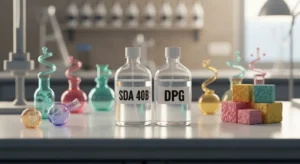
SDA 40B & DPG: Essential Ingredients in Fragrance Formulation
Behind every beautifully crafted perfume, cologne, or room spray lies a complex blend of science and artistry. While fragrance oils

Perfumer’s Alcohol: Uses in Perfumes, Colognes & Room Sprays
Perfume and fragrance creation is both an art and a science. Behind every bottle of perfume, cologne, or room spray
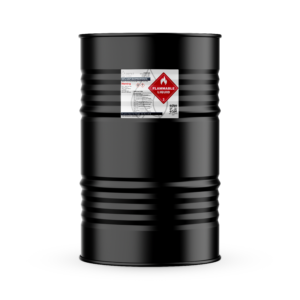
Isopropyl Alcohol Uses
Isopropyl Alcohol Uses by Different Industries Isopropyl Alcohol (IPA) is a versatile chemical with various uses across various industries. It

All You Need to Know About Ethanol and Its Various Uses
All You Need to Know About Ethanol and Its Various Uses Ethanol and Its Various Uses in fuels are essential

The Power of Ethanol: Fun Ethanol Facts on Safety and Industry
The Power of Ethanol: Ethanol Facts on Safety and Industry We are going to go over ethanol facts, uses and

Shipping Dangerous Goods: Regulations and Precautions
Shipping Dangerous Goods: Regulations and Precautions Shipping dangerous goods can be a tricky and sensitive process. It is crucial to
